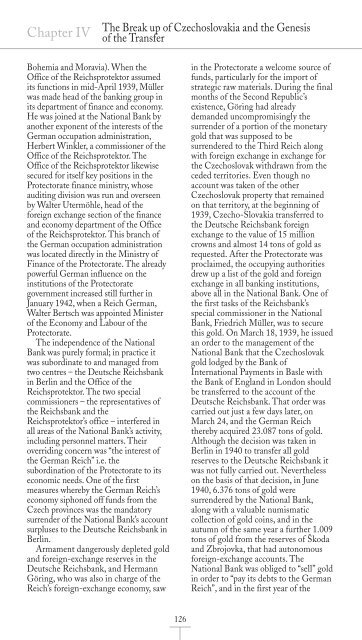the nationality of all inhabitants of the czech provinces and ...
the nationality of all inhabitants of the czech provinces and ...
the nationality of all inhabitants of the czech provinces and ...
You also want an ePaper? Increase the reach of your titles
YUMPU automatically turns print PDFs into web optimized ePapers that Google loves.
Chapter IV<br />
Bohemia <strong>and</strong> Moravia). When <strong>the</strong><br />
Office <strong>of</strong> <strong>the</strong> Reichsprotektor assumed<br />
its functions in mid-April 1939, Müller<br />
was made head <strong>of</strong> <strong>the</strong> banking group in<br />
its department <strong>of</strong> finance <strong>and</strong> economy.<br />
He was joined at <strong>the</strong> National Bank by<br />
ano<strong>the</strong>r exponent <strong>of</strong> <strong>the</strong> interests <strong>of</strong> <strong>the</strong><br />
German occupation administration,<br />
Herbert Winkler, a commissioner <strong>of</strong> <strong>the</strong><br />
Office <strong>of</strong> <strong>the</strong> Reichsprotektor. The<br />
Office <strong>of</strong> <strong>the</strong> Reichsprotektor likewise<br />
secured for itself key positions in <strong>the</strong><br />
Protectorate finance ministry, whose<br />
auditing division was run <strong>and</strong> overseen<br />
by Walter Utermöhle, head <strong>of</strong> <strong>the</strong><br />
foreign exchange section <strong>of</strong> <strong>the</strong> finance<br />
<strong>and</strong> economy department <strong>of</strong> <strong>the</strong> Office<br />
<strong>of</strong> <strong>the</strong> Reichsprotektor. This branch <strong>of</strong><br />
<strong>the</strong> German occupation administration<br />
was located directly in <strong>the</strong> Ministry <strong>of</strong><br />
Finance <strong>of</strong> <strong>the</strong> Protectorate. The already<br />
powerful German influence on <strong>the</strong><br />
institutions <strong>of</strong> <strong>the</strong> Protectorate<br />
government increased still fur<strong>the</strong>r in<br />
January 1942, when a Reich German,<br />
Walter Bertsch was appointed Minister<br />
<strong>of</strong> <strong>the</strong> Economy <strong>and</strong> Labour <strong>of</strong> <strong>the</strong><br />
Protectorate.<br />
The independence <strong>of</strong> <strong>the</strong> National<br />
Bank was purely formal; in practice it<br />
was subordinate to <strong>and</strong> managed from<br />
two centres – <strong>the</strong> Deutsche Reichsbank<br />
in Berlin <strong>and</strong> <strong>the</strong> Office <strong>of</strong> <strong>the</strong><br />
Reichsprotektor. The two special<br />
commissioners – <strong>the</strong> representatives <strong>of</strong><br />
<strong>the</strong> Reichsbank <strong>and</strong> <strong>the</strong><br />
Reichsprotektor’s <strong>of</strong>fice – interfered in<br />
<strong>all</strong> areas <strong>of</strong> <strong>the</strong> National Bank’s activity,<br />
including personnel matters. Their<br />
overriding concern was “<strong>the</strong> interest <strong>of</strong><br />
<strong>the</strong> German Reich” i.e. <strong>the</strong><br />
subordination <strong>of</strong> <strong>the</strong> Protectorate to its<br />
economic needs. One <strong>of</strong> <strong>the</strong> first<br />
measures whereby <strong>the</strong> German Reich’s<br />
economy siphoned <strong>of</strong>f funds from <strong>the</strong><br />
Czech <strong>provinces</strong> was <strong>the</strong> m<strong>and</strong>atory<br />
surrender <strong>of</strong> <strong>the</strong> National Bank’s account<br />
surpluses to <strong>the</strong> Deutsche Reichsbank in<br />
Berlin.<br />
Armament dangerously depleted gold<br />
<strong>and</strong> foreign-exchange reserves in <strong>the</strong><br />
Deutsche Reichsbank, <strong>and</strong> Hermann<br />
Göring, who was also in charge <strong>of</strong> <strong>the</strong><br />
Reich’s foreign-exchange economy, saw<br />
The Break up <strong>of</strong> Czechoslovakia <strong>and</strong> <strong>the</strong> Genesis<br />
<strong>of</strong> <strong>the</strong> Transfer<br />
126<br />
in <strong>the</strong> Protectorate a welcome source <strong>of</strong><br />
funds, particularly for <strong>the</strong> import <strong>of</strong><br />
strategic raw materials. During <strong>the</strong> final<br />
months <strong>of</strong> <strong>the</strong> Second Republic’s<br />
existence, Göring had already<br />
dem<strong>and</strong>ed uncompromisingly <strong>the</strong><br />
surrender <strong>of</strong> a portion <strong>of</strong> <strong>the</strong> monetary<br />
gold that was supposed to be<br />
surrendered to <strong>the</strong> Third Reich along<br />
with foreign exchange in exchange for<br />
<strong>the</strong> Czechoslovak withdrawn from <strong>the</strong><br />
ceded territories. Even though no<br />
account was taken <strong>of</strong> <strong>the</strong> o<strong>the</strong>r<br />
Czechoslovak property that remained<br />
on that territory, at <strong>the</strong> beginning <strong>of</strong><br />
1939, Czecho-Slovakia transferred to<br />
<strong>the</strong> Deutsche Reichsbank foreign<br />
exchange to <strong>the</strong> value <strong>of</strong> 15 million<br />
crowns <strong>and</strong> almost 14 tons <strong>of</strong> gold as<br />
requested. After <strong>the</strong> Protectorate was<br />
proclaimed, <strong>the</strong> occupying authorities<br />
drew up a list <strong>of</strong> <strong>the</strong> gold <strong>and</strong> foreign<br />
exchange in <strong>all</strong> banking institutions,<br />
above <strong>all</strong> in <strong>the</strong> National Bank. One <strong>of</strong><br />
<strong>the</strong> first tasks <strong>of</strong> <strong>the</strong> Reichsbank’s<br />
special commissioner in <strong>the</strong> National<br />
Bank, Friedrich Müller, was to secure<br />
this gold. On March 18, 1939, he issued<br />
an order to <strong>the</strong> management <strong>of</strong> <strong>the</strong><br />
National Bank that <strong>the</strong> Czechoslovak<br />
gold lodged by <strong>the</strong> Bank <strong>of</strong><br />
International Payments in Basle with<br />
<strong>the</strong> Bank <strong>of</strong> Engl<strong>and</strong> in London should<br />
be transferred to <strong>the</strong> account <strong>of</strong> <strong>the</strong><br />
Deutsche Reichsbank. That order was<br />
carried out just a few days later, on<br />
March 24, <strong>and</strong> <strong>the</strong> German Reich<br />
<strong>the</strong>reby acquired 23.087 tons <strong>of</strong> gold.<br />
Although <strong>the</strong> decision was taken in<br />
Berlin in 1940 to transfer <strong>all</strong> gold<br />
reserves to <strong>the</strong> Deutsche Reichsbank it<br />
was not fully carried out. Never<strong>the</strong>less<br />
on <strong>the</strong> basis <strong>of</strong> that decision, in June<br />
1940, 6.376 tons <strong>of</strong> gold were<br />
surrendered by <strong>the</strong> National Bank,<br />
along with a valuable numismatic<br />
collection <strong>of</strong> gold coins, <strong>and</strong> in <strong>the</strong><br />
autumn <strong>of</strong> <strong>the</strong> same year a fur<strong>the</strong>r 1.009<br />
tons <strong>of</strong> gold from <strong>the</strong> reserves <strong>of</strong> Škoda<br />
<strong>and</strong> Zbrojovka, that had autonomous<br />
foreign-exchange accounts. The<br />
National Bank was obliged to “sell” gold<br />
in order to “pay its debts to <strong>the</strong> German<br />
Reich”, <strong>and</strong> in <strong>the</strong> first year <strong>of</strong> <strong>the</strong>


